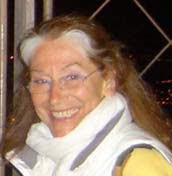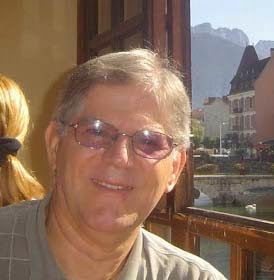 by Tom Kando
by Tom Kando
Trump has signed an executive order banning immigration from a number of countries. This affects first and foremost refugees - for example from war-torn Syria.
So this is an opportune time for me to share with you my own past, as a refugee:
I was born in Budapest at the beginning of World War Two. My family survived the horror of the war, the Holocaust (we are Jewish), the Nazi and then the Soviet occupation. My first foray out of Hungary occurred one year after the end of the war, when I was sent to a refugee camp in Italy. I remember sleeping in an underground bunker. Then, a year later, we fled to Paris. I was seven. We became refugees in France. My only official identity paper was a United Nations document declaring me to be an “Apatride.” This means “stateless,” someone without a country. I remember this card well. It carried the familiar UN Logo.
For the next thirteen years, I grew up in Paris and in Amsterdam as an “apatride.” It was practically impossible to travel even into the country next door. Even visiting friends in Belgium, seventy miles away, required a visa, which required almost insurmountable bureaucratic endeavors.
Once I tried to travel from Holland to Italy by car with a Dutch girlfriend. Because she had some business to take care of in Geneva and also because that is the shortest route, our itinerary went through Switzerland. However, when we arrived at the French-Swiss border, the guards, while letting my Dutch girlfriend pass through, denied me entry.
We decided that she would drive across Switzerland, take care of her affairs in Geneva, that I would hitch-hike through the rest of France by myself (back then, I was so poor that I did all my travel that way), cross over into Italy (for which I had a visa) and meet up again in Milan.
Which we did. But to this day, my most vivid memory of that trip is that of the armed Swiss border guard shouting threats at me and ordering me to promptly leave the border area, to walk back towards France, or else!
My family and I experienced such maltreatment frequently. After all, we were Hungarian scum; Eastern European riff-raff.; barely human. Once my parents, my sisters and I were stuck at the French-Belgian border near the town of Maubeuge. We were, again, trying to hitch-hike to our destination (Holland, on this occasion). Again the border guards were menacing and ordering us to retreat from the border. By nightfall, cold and hungry, we entered a café and tried to order some food and cocoa. We were told to get out. We ended up sleeping on benches at the railroad station. I was thirteen.
We moved permanently from Paris to Amsterdam when I was fourteen. My mother had remarried a Dutchman, and this automatically gave her Dutch citizenship. However, we, her three children, were not so lucky. We remained stateless. So guess what? When we moved from France to Holland, we did not have the right to cross Belgium! So my mother and my stepfather hitch-hiked, and my sisters and I had to fly. I kid you not. Somehow they scrounged up the money for three children’s air tickets. There was no other way.
By the time I was eighteen, I was fed-up with all such bs. I decided to go to America. I was no different from millions of other uprooted, struggling, unhappy and dynamic people for whom America had been the destination of choice for over a century.
I did it the old-fashioned way. I got on an old World War Two Liberty ship in Rotterdam (the “Grote Beer”) with fifteen hundred other emigrants, and ten days later I sailed by the Statue of Liberty and landed in Hoboken, New Jersey. I had spent ten days sharing a cabin with a dozen bunk beds, in steerage, looking at the green water behind the porthole. I had fifty dollars in my pocket. My English was practically non-existent.
You have seen the movie Titanic, haven’t you? Well, apart from the sinking bit, I was Leonardo diCaprio. That’s how I came over. The old-fashioned way. I was one of the “...tired, the poor, the huddled masses yearning to breathe free, the wretched refuse of the teeming shore, the homeless, tempest-tossed...”
I spent my first three months in New York, sometimes drinking a lot (Gordon’s Gin), sleeping sometimes at the place of a photographer whose address my mother had given to me, sometimes at the Salvation Army, and sometimes under the stars.
One night I fell asleep on a bench in Central Park. At four A.M., I was awakened by two of New York’s finest.
“Hey Bud, they asked, don’t you know you could get killed here?”
They then drove me to the Salvation Army (or maybe the YMCA, I forget which) and they gave the clerk a few dollars to pay for my night there and for my breakfast. Yes, New York’s finest. And a taste of America.
I then spent my first year on a Fulbright scholarship at Union College in Schenectady, New York. That’s how my metamorphosis from being a refugee began.
Of course, at the end of the academic year, I had to return to Holland. I was still an “apatride.” But I had a burning desire to return to America.
Back then, immigrants to the US were admitted on a quota basis: Each country was entitled to a certain number of immigrants. Unfortunately, the US classified me as Hungarian, because that’s where I was born. And the Hungarian quota was more than full, because the 1956 Hungarian uprising against the USSR had produced half a million refugees, several hundred thousand of whom ended up in America.
So I waited, and waited. I also married my American girlfriend, whom I had met when I was in Union College. After five years, I was admitted on a student visa to the University of Minnesota’s PhD program. Soon after my arrival in the US, I got my green card.
Then, another five year wait. I finally became a US citizen at the age of twenty-eight, after I had my PhD and after I became a university professor. Ten years it took. And for the first time in my life, I was no longer a stateless refugee. For the first time, I had a passport, I could travel.
My naturalization was memorable: I went in front of the judge, a venerable and distinguished grey-haired gentleman. He asked me a few questions. For example:
“Son, what is the Constitution of the United States?”
Fresh out of grad school and pedantic, I began to answer him with some convoluted verbiage:
“Hm..it’s..ah..the official document which legislates and regulates the normative...”
The judge cut me off and said:
“Son, it’s THE LAW OF THE LAND.” Period.
And with that he handed me a small pocket-size US flag, shook my hand and congratulated me with a big smile:
“You are now an American.”
I still have and cherish the small flag.
So that’s my story. Being a refugee, being stateless, being an “apatride” is no fun. Never forget. Be nice. Be welcoming. Be a real American.
© Tom Kando 2017;All Rights Reserved
leave comment here
Youtube
Contact Form
Popular Posts
-
By Madeleine Kando Flying is like signing away your rights as a human being. Not only is your life put on hold, but you never know which sid...
-
By Tom Kando Only one thing aggravates me more than the mistakes of the electorate - as exemplified by the Democratic loss in Massachusett...
-
by Madeleine Kando We left Boston early Sunday morning, the day before the 2024 Solar Eclipse. We have friends who live close to the Canadia...
-
Tom Kando Some societies are more successful than others. Today, there are successful societies such as Australia, Canada and Scandinavia,...
Tom's Publications and Essays
Madeleine's Publications and Essays
interesting links
Publish Your Article!
A valid author name is required. We will create live links to url's that you specify in your post. Please be patient, and allow us some time to read and approve your article.We reserve the right to refuse any articles that are not deemed appropriate for this blog.








